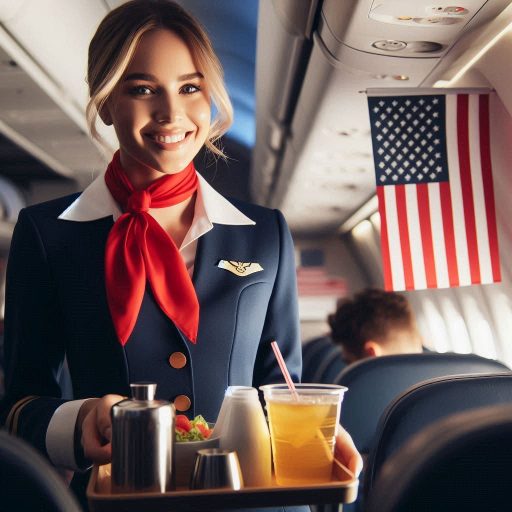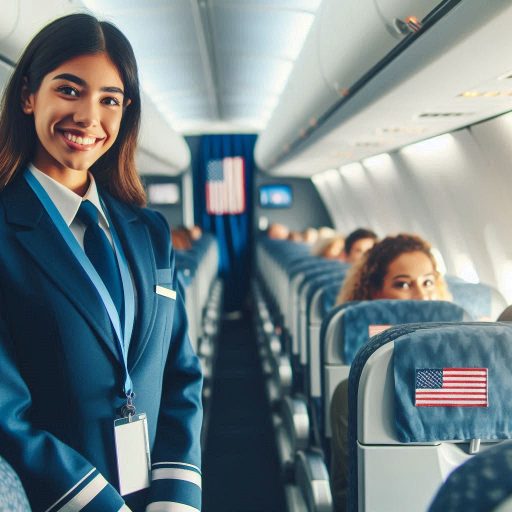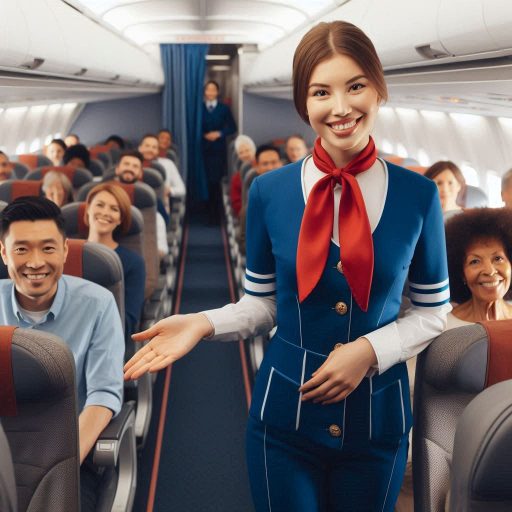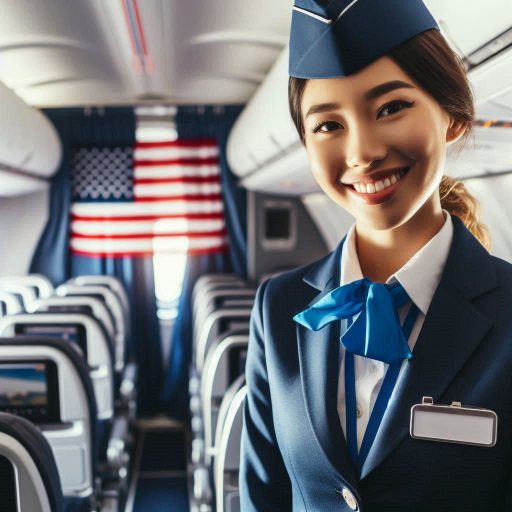Introduction
Flight attendants play a crucial role in the airline industry, serving as the primary point of contact for passengers throughout their journey.
Their presence ensures that travelers feel secure and well cared for from the moment they step onto the plane until they reach their destination.
Flight attendants are responsible for providing excellent customer service while also prioritizing safety.
They conduct safety briefings, demonstrate emergency procedures, and ensure compliance with regulations, making their job essential to a positive travel experience.
In addition to their customer service duties, flight attendants are trained to handle a wide variety of situations.
They must be prepared to respond to emergencies, such as medical issues, turbulence, or evacuation procedures.
Their expertise in crisis management helps create a secure environment for both passengers and crew members, contributing to overall flight safety.
Currently, the demand for flight attendants in the USA is at an all-time high.
With the travel industry rebounding after the pandemic, airlines are eager to hire more staff to accommodate the increasing number of travelers.
This growing need presents a fantastic opportunity for individuals interested in pursuing a rewarding career in aviation.
Research the job requirements
Educational Qualifications Needed to Become a Flight Attendant
To become a flight attendant in the USA, you typically need a high school diploma or equivalent.
Many airlines prefer candidates with some college education, especially in hospitality or communications.
Some airlines also look favorably on applicants with degrees in fields like travel and tourism.
Additional training in customer service or emergency procedures can be beneficial.
Flight attendants must complete a training program after being hired.
These programs usually last several weeks and cover essential topics.
Trainees learn about safety protocols, emergency procedures, and customer service skills.
Airlines often provide this training at no cost to the employees.
Having certifications in first aid and CPR can enhance your application.
While not always required, these certifications demonstrate your commitment to passenger safety.
Additionally, being bilingual or multilingual is a plus.
Many airlines value candidates who can communicate with diverse passengers.
Skills and Traits That Airlines Look for in Candidates
Airlines seek specific skills and traits in flight attendant candidates.
Excellent communication skills are essential for interacting with passengers and crew members.
Flight attendants must clearly convey safety information and answer questions professionally.
Strong interpersonal skills help build rapport with passengers, enhancing their overall travel experience.
Adaptability is another critical trait for flight attendants.
They often work in fast-paced environments and must quickly respond to changing situations.
Being calm under pressure is essential, especially during emergencies or dealing with difficult passengers.
Customer service skills are crucial in this role.
Flight attendants should strive to provide exceptional service to all passengers.
This dedication to customer satisfaction can set candidates apart during the hiring process.
A positive attitude and a willingness to help are highly valued by airlines.
Finally, teamwork is vital for flight attendants.
They must work closely with pilots and fellow crew members to ensure a safe and enjoyable flight.
Effective collaboration promotes a smooth operation and enhances passenger safety.
Physical Requirements Such as Height, Weight, and Vision Standards
Physical requirements for flight attendants can vary by airline, but some general standards exist.
Most airlines require flight attendants to be between 5’0″ and 6’0″ tall.
This height range ensures that attendants can reach overhead compartments and perform safety checks efficiently.
Weight standards are often linked to a candidate’s overall health and appearance.
Airlines typically expect flight attendants to maintain a professional appearance that reflects their brand.
While specific weight limits may not be listed, candidates should be within a healthy weight range for their height.
Vision standards are also crucial for flight attendants.
Most airlines require candidates to have 20/40 vision, either with or without corrective lenses.
Good vision is essential for reading instruments, signs, and safety information during flights.
Additionally, candidates may need to pass a medical examination to ensure overall fitness for duty.
Basically, becoming a flight attendant in the USA involves meeting educational qualifications, demonstrating key skills and traits, and adhering to physical requirements.
By preparing in these areas, aspiring flight attendants can enhance their chances of landing their dream job in the aviation industry.
Obtain the necessary education and training
Enroll in a Flight Attendant Training Program or Certification Course
Begin by researching reputable flight attendant training programs.
Look for schools that offer comprehensive training, including in-flight service, safety protocols, and emergency procedures.
Online and in-person courses are available, catering to different learning preferences.
Completing a certification course enhances your resume and makes you a more attractive candidate to airlines.
Programs typically last several weeks and include hands-on training to prepare you for real-life scenarios.
Once you choose a program, ensure it aligns with your career goals.
Some courses may focus on specific airline requirements or regional markets.
Enrolling in a recognized program demonstrates your commitment to the profession.
Gain Knowledge in Safety Procedures, Customer Service, and Aviation Industry Regulations
A vital part of flight attendant training involves learning safety procedures.
Familiarizing yourself with emergency protocols is essential for passenger safety.
You will learn how to respond to various situations, including medical emergencies and evacuations.
Additionally, understanding aircraft operations and safety equipment is crucial.
This knowledge ensures you can assist passengers effectively during emergencies.
Customer service training is another critical component.
Flight attendants often serve as the face of the airline, so excellent service is essential.
Programs teach you how to interact with passengers positively and handle complaints professionally.
You will also learn how to manage diverse passenger needs and expectations.
Understanding aviation industry regulations is equally important.
Familiarize yourself with FAA guidelines and airline policies.
This knowledge helps ensure compliance and enhances your ability to work effectively within the industry.
Develop Communication and Problem-Solving Skills
Strong communication skills are vital for flight attendants.
You will interact with passengers and crew members daily.
Practicing active listening and clear communication helps build rapport with passengers.
Additionally, honing your public speaking skills prepares you for announcements and safety demonstrations.
Problem-solving skills are equally crucial.
In-flight situations can change rapidly, and you must think on your feet.
Training programs often include scenario-based exercises to develop these skills.
Practicing real-life scenarios prepares you for unexpected challenges.
You will learn how to assess situations quickly and determine the best course of action.
Therefore, becoming a flight attendant in the USA requires focused training and skill development.
Enroll in a flight attendant training program to gain essential knowledge in safety procedures, customer service, and regulations.
Additionally, develop strong communication and problem-solving skills to excel in this rewarding career.
With dedication and preparation, you can achieve your goal of becoming a flight attendant.
Read: The Role of Technology in Modern Pet Grooming
Gain work experience
Seek Part-Time or Entry-Level Positions in Customer Service or Hospitality Industry
Aspiring flight attendants should seek part-time or entry-level positions in customer service.
These roles help develop essential skills like communication and problem-solving.
Working in hospitality, retail, or food service teaches you how to handle various customer interactions.
These experiences will prepare you for the dynamic environment of an airplane.
Consider applying for jobs at hotels, restaurants, or retail stores.
These positions provide opportunities to learn how to manage customer expectations.
You will also gain valuable experience in resolving conflicts and ensuring customer satisfaction.
Many airlines prioritize candidates with strong customer service backgrounds.
This experience can make your application stand out during the hiring process.
Additionally, familiarize yourself with the travel industry.
Understanding customer preferences and needs can provide a competitive advantage.
Research different airlines and their service standards to better align your skills with their requirements.
Volunteer or Intern at Airlines, Airports, or Travel Agencies
Gaining experience through volunteer or internship opportunities is crucial.
Many airlines offer internship programs that allow you to learn about the industry.
These internships provide firsthand knowledge of flight operations and customer service practices.
They also give you insight into the day-to-day responsibilities of flight attendants.
Volunteering at airports or travel agencies can also be beneficial.
Many airports have programs that allow volunteers to assist with guest services.
This experience exposes you to the airport environment and helps you build valuable connections.
You can learn how airlines operate behind the scenes, which enhances your understanding of the role.
Additionally, internships or volunteer positions often lead to job opportunities.
Many airlines prefer to hire individuals who have shown commitment and enthusiasm for the industry.
By gaining relevant experience, you increase your chances of being hired as a flight attendant.
Network with Current Flight Attendants to Learn About Their Experiences
Networking with current flight attendants can provide valuable insights.
These professionals can share their experiences and offer advice on succeeding in the industry.
Attend industry events, job fairs, or workshops to meet flight attendants and airline representatives.
Engaging in conversations with them can help you understand what airlines look for in candidates.
Consider reaching out on professional networking platforms like LinkedIn.
Connect with flight attendants who share their experiences and offer tips.
You can also join online forums or social media groups dedicated to aspiring flight attendants.
These platforms provide a space for discussions and advice from industry insiders.
Learning from others’ experiences can help you prepare for the application process.
Understanding the challenges and rewards of being a flight attendant can clarify your decision.
Building relationships within the industry may also lead to potential job opportunities down the line.
In review, aspiring flight attendants should seek part-time roles in customer service, volunteer at relevant organizations, and network with industry professionals.
These steps will provide valuable skills, experience, and connections as you pursue your dream career in the skies.
Read: Customer Service Tips for Pet Grooming Professionals
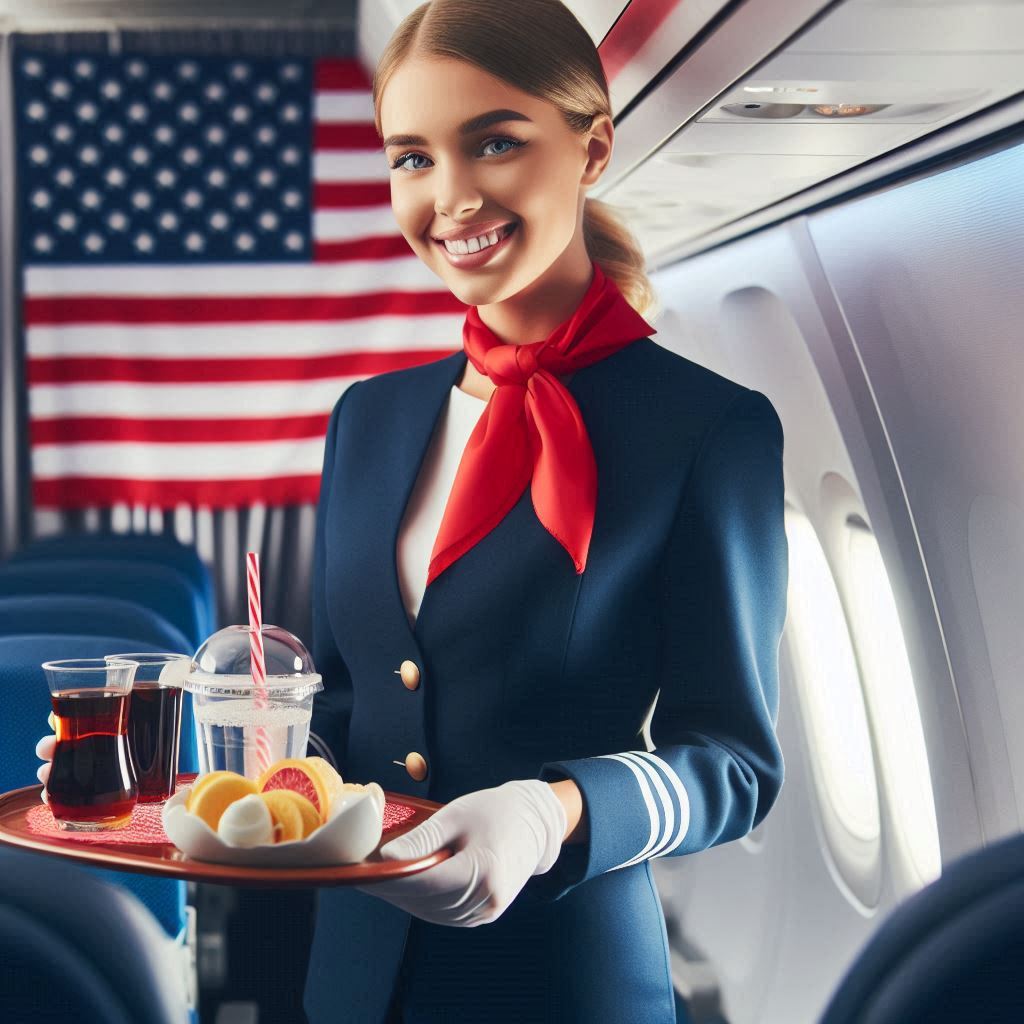
Create a professional resume and cover letter
Highlight Relevant Skills, Experiences, and Qualifications
Becoming a flight attendant requires specific skills, experiences, and qualifications.
Airlines look for candidates with strong customer service skills.
Experience in hospitality, retail, or related fields can set you apart.
Excellent communication skills are essential for interacting with passengers and crew.
You must also demonstrate problem-solving abilities, especially during emergencies.
Flexibility and adaptability are crucial traits for flight attendants.
You will often work irregular hours and navigate various time zones.
Showcasing these qualities in your application is vital.
Additionally, having a positive attitude and a strong work ethic can make a significant difference.
Educational qualifications also matter.
While a high school diploma is the minimum requirement, many airlines prefer candidates with a college degree.
Courses in communication, hospitality, or travel can be beneficial.
Highlight any relevant training or coursework on your resume.
Volunteering or participating in community service can demonstrate your commitment to helping others.
Customize Your Resume and Cover Letter for Each Airline You Apply To
When applying to airlines, tailor your resume and cover letter for each position.
Start by researching the specific airline and its values.
Understand their culture and what they seek in a flight attendant.
Use this information to align your application with their expectations.
In your resume, emphasize experiences that match the airline’s needs.
For example, if an airline values teamwork, highlight experiences where you collaborated effectively.
Use action verbs to showcase your accomplishments and contributions.
This makes your resume more dynamic and engaging.
In your cover letter, express your passion for the airline and the flight attendant role.
Explain why you want to work for them specifically.
Personalizing your application shows genuine interest and dedication.
Additionally, keep your documents concise and well-organized.
Aim for clarity and professionalism in your writing.
Include Any Language Proficiency or Additional Certifications
Language proficiency can give you a significant advantage in the flight attendant hiring process.
Many airlines serve international routes and prefer bilingual candidates.
If you speak multiple languages, prominently display this information on your resume.
Highlighting your language skills can set you apart from other applicants.
Additional certifications also enhance your application.
Consider obtaining a CPR or first aid certification.
These skills are valuable in emergency situations and demonstrate your preparedness.
Some airlines may offer training programs for aspiring flight attendants.
Participating in these programs shows initiative and commitment to your career.
If you have completed any customer service or hospitality training, include those certifications as well.
These credentials reinforce your qualifications and readiness for the role.
By showcasing your skills, tailoring your applications, and including relevant certifications, you enhance your chances of success.
In general, highlighting relevant skills, customizing your resume, and showcasing language proficiency will help you stand out as a candidate.
Take these steps to launch your career as a flight attendant in the USA.
Read: Nail Technician Etiquette: Dos and Don’ts
Apply for flight attendant positions
Search for Job Openings on Airline Websites, Job Boards, and Career Fairs
To become a flight attendant in the USA, start by searching for job openings.
Visit airline websites to find current listings.
Many airlines post their available positions directly on their careers page.
Job boards such as Indeed and Glassdoor also provide a wealth of opportunities.
Regularly check these platforms for the latest postings and updates.
Additionally, attend career fairs focused on aviation and hospitality.
These events often feature multiple airlines seeking new talent.
You can meet recruiters face-to-face, making a strong impression.
Prepare your resume and practice your elevator pitch before attending.
Networking at these fairs can lead to valuable connections in the industry.
Stay organized by creating a spreadsheet to track applications.
Include the airline name, position, and application deadline for each job.
This will help you manage your job search efficiently and ensure you don’t miss opportunities.
Follow the Application Instructions Carefully and Submit All Required Documents
Once you identify job openings, carefully follow the application instructions.
Each airline may have different requirements and preferences.
Read the job description thoroughly to understand what documents you need to submit.
Common requirements include a resume, cover letter, and proof of relevant certifications.
Tailor your resume to highlight skills and experiences relevant to flight attending.
A well-crafted cover letter should express your enthusiasm for the position and the airline.
Before hitting submit, double-check your documents for errors.
Make sure your contact information is up-to-date and accurate.
Ensure that you’ve included any necessary references or additional materials.
Submitting a complete application reflects your professionalism and attention to detail.
Prepare for Interviews by Researching the Airline and Practicing Common Interview Questions
Preparation is key to succeeding in your flight attendant interview.
Start by researching the airline you’re applying to.
Familiarize yourself with their values, mission, and recent news.
Understanding the airline’s culture will help you answer questions more effectively.
Next, practice common interview questions that flight attendants might face.
Questions often include topics such as customer service experience and conflict resolution.
Prepare answers that showcase your skills and provide specific examples.
Consider conducting mock interviews with friends or family.
This practice will help you become more comfortable with the interview format.
They can provide feedback on your responses and body language.
Additionally, prepare questions to ask the interviewer.
Inquiring about the training process or team dynamics shows your interest in the role.
Engaging in a two-way conversation makes a positive impression.
Lastly, dress professionally for the interview.
A polished appearance demonstrates your seriousness about the position.
Arrive on time and display a positive attitude throughout the process.
By following these steps, you can navigate the journey to becoming a flight attendant successfully.
Searching for job openings, submitting thorough applications, and preparing for interviews will set you apart from other candidates.
With determination and preparation, you can take the first steps toward a rewarding career in the skies.
Read: Developing Patience and Precision in Pet Grooming
Transform Your Career Today
Unlock a personalized career strategy that drives real results. Get tailored advice and a roadmap designed just for you.
Start NowAttend the airline’s training program
Successfully Complete the Airline’s Training Program
Becoming a flight attendant starts with successfully completing the airline’s training program.
This program typically lasts several weeks and covers essential topics.
You will learn about safety procedures, emergency protocols, and customer service.
Each airline has specific training requirements, so be sure to understand them.
During training, you will engage in both classroom and hands-on learning.
Instructors will teach you about aircraft types, safety equipment, and emergency exits.
You will also practice emergency procedures in simulated scenarios.
This training prepares you for real-life situations you may encounter while flying.
Customer service training is another crucial aspect of your program.
You will learn how to communicate effectively with passengers.
Handling difficult situations with grace is essential in this role.
Practice your interpersonal skills through role-playing exercises and group activities.
These experiences build your confidence and equip you for the job.
Pass Any Required Exams and Assessments
After completing the training program, you must pass any required exams and assessments.
These evaluations test your knowledge of safety protocols and customer service principles.
Take these assessments seriously, as they determine your readiness for the role.
Review your training materials thoroughly to prepare for the exams.
Study the safety procedures, emergency protocols, and customer service guidelines.
If your airline offers practice tests, utilize them to gauge your understanding.
This preparation can significantly boost your confidence.
If you struggle with any topics, don’t hesitate to seek help.
Connect with fellow trainees or instructors for additional support.
They can provide valuable insights and clarify any questions.
Remember, your goal is to become a proficient flight attendant.
Receive Your Flight Attendant Certification and Begin Flying
Once you pass all required exams, you will receive your flight attendant certification.
This certification signifies that you are qualified to work on commercial flights.
Celebrate this achievement, as it is a significant milestone in your career.
After certification, you will begin flying as a new flight attendant.
Your first flights may involve shadowing experienced crew members.
This shadowing experience allows you to learn on the job.
Observe how they handle various situations and interact with passengers.
As you gain experience, you will develop your own style.
Embrace opportunities to enhance your skills further.
Attend additional training sessions and workshops offered by your airline.
Continuous learning is vital in this dynamic field.
Generally, the journey to becoming a flight attendant involves completing an airline’s training program, passing exams, and receiving certification.
Stay focused and dedicated during your training.
Your commitment will lead to a rewarding career in the skies.
Enjoy the journey and embrace the exciting experiences that lie ahead as a flight attendant.
Conclusion
Becoming a flight attendant in the USA involves several key steps that aspiring candidates should follow.
First, ensure you meet the basic requirements, which typically include being at least 18 years old and possessing a high school diploma or equivalent.
Many airlines prefer candidates with a college degree, so consider pursuing higher education for better opportunities.
Next, gaining customer service experience is crucial.
Working in roles that require interaction with the public will enhance your communication and problem-solving skills.
Once you feel prepared, begin applying to airlines.
This process often includes submitting an online application and attending interviews.
If selected, you will then complete the airline’s training program.
This training usually lasts several weeks and covers essential topics like safety procedures, emergency protocols, and customer service techniques.
Upon successful completion, you must obtain necessary certifications, such as the Federal Aviation Administration (FAA) certification, to ensure compliance with safety regulations.
Flexibility and openness to travel are essential qualities for flight attendants.
You will often work irregular hours, including nights, weekends, and holidays.
However, the rewards of this career can make it worthwhile.
Pursuing a career in aviation can lead to incredibly rewarding experiences.
[E-Books for Sale]
The Big Book of 500 High-Paying Jobs in America: Unlock Your Earning Potential
$19.99 • 500 High-Paying Jobs • 330 pages
Explore 500 high-paying jobs in America and learn how to boost your career, earn more, and achieve success!
See All 500 High-Paying Jobs of this E-Book
1001 Professions Without a Degree: High-Paying American Jobs You Can Start Now
$19.99 • 1001 Professions Without a Degree • 174 pages
Discover 1001 high-paying jobs without a degree! Unlock career tips, skills, and success strategies for just $19.99!

